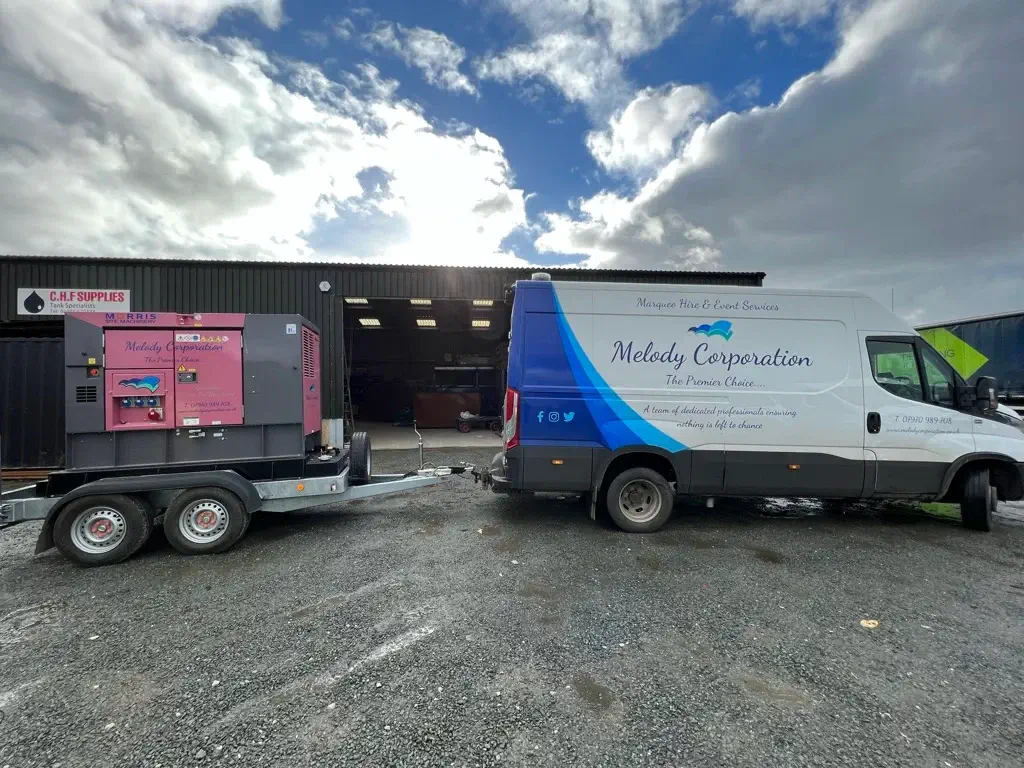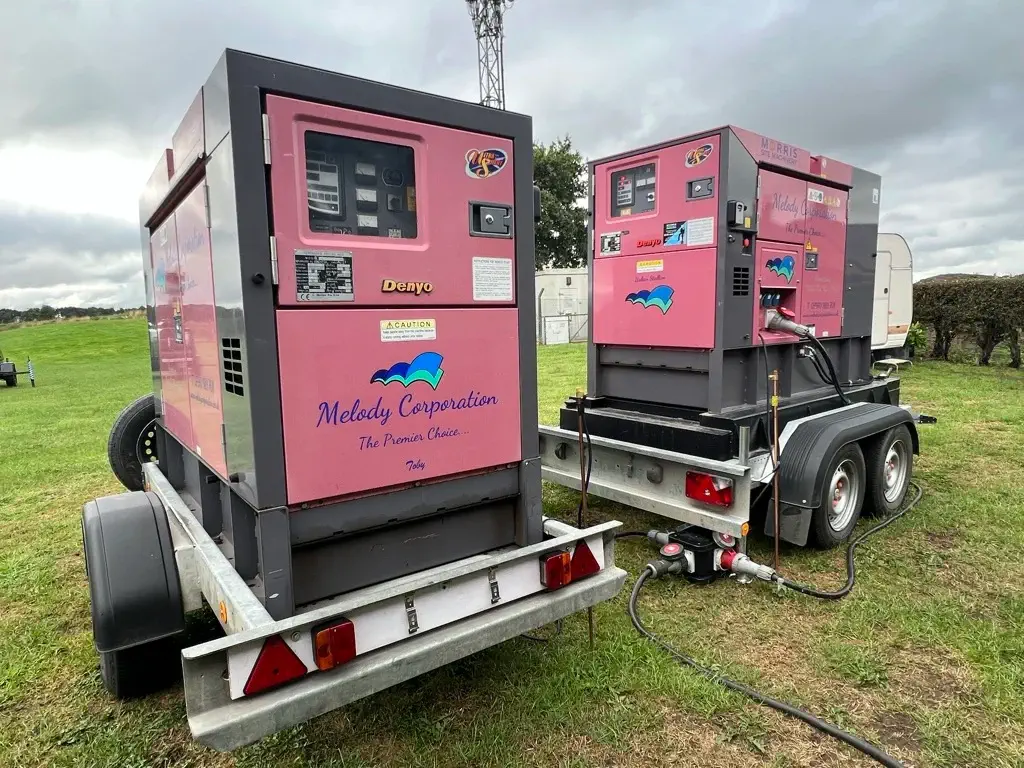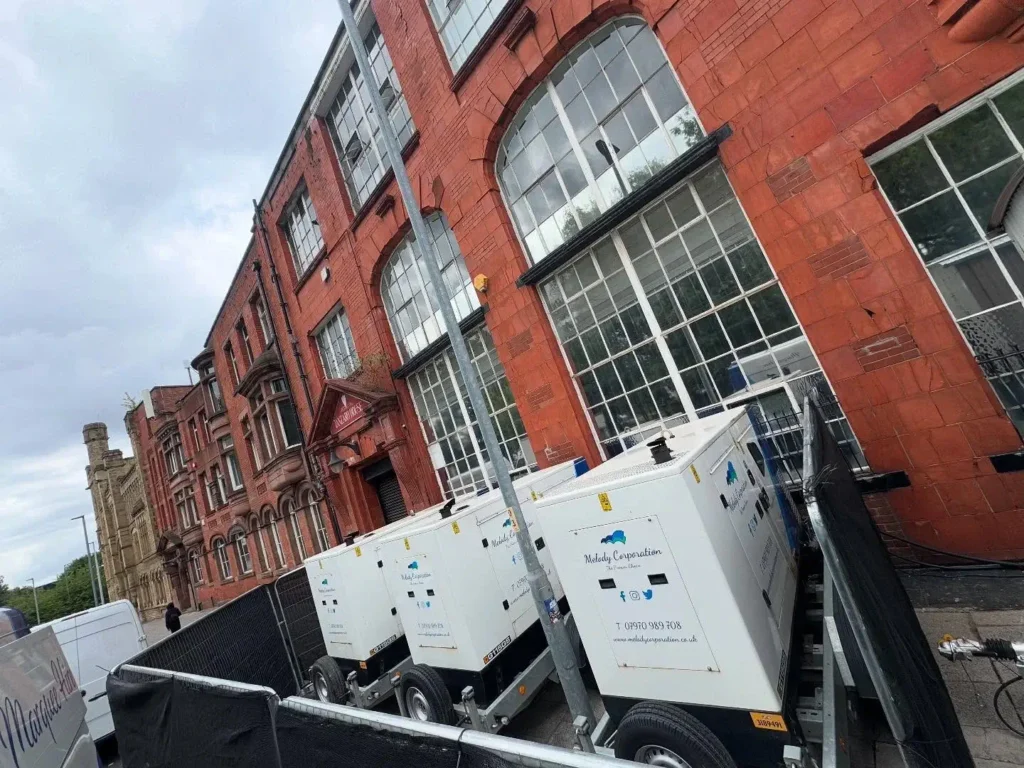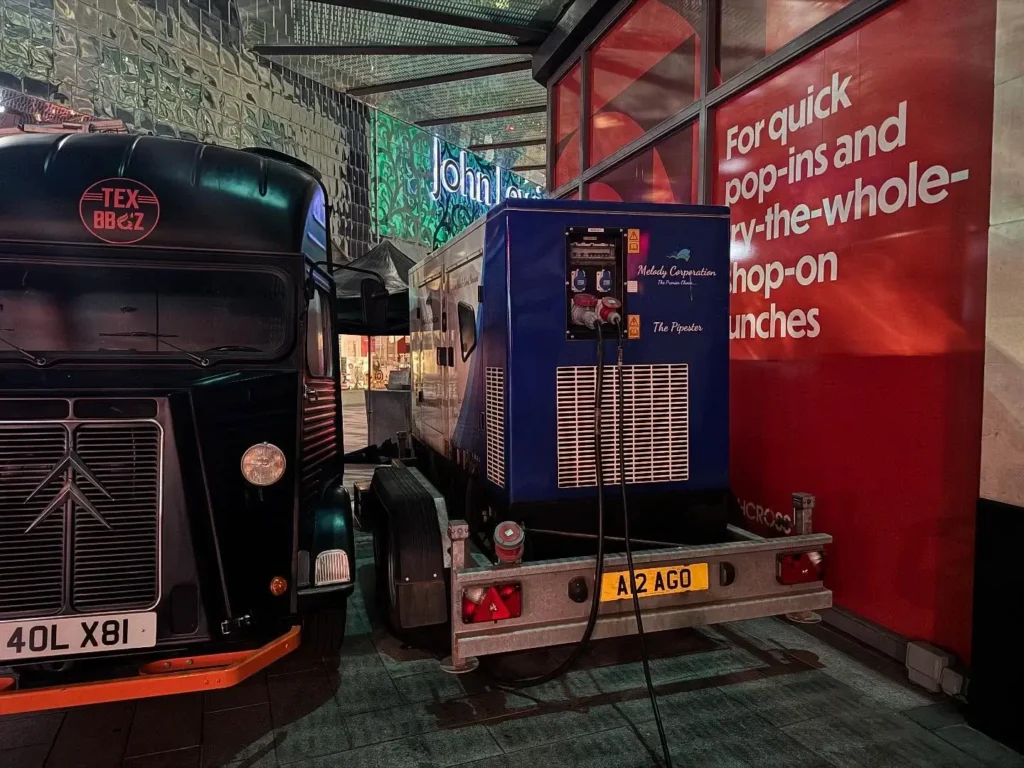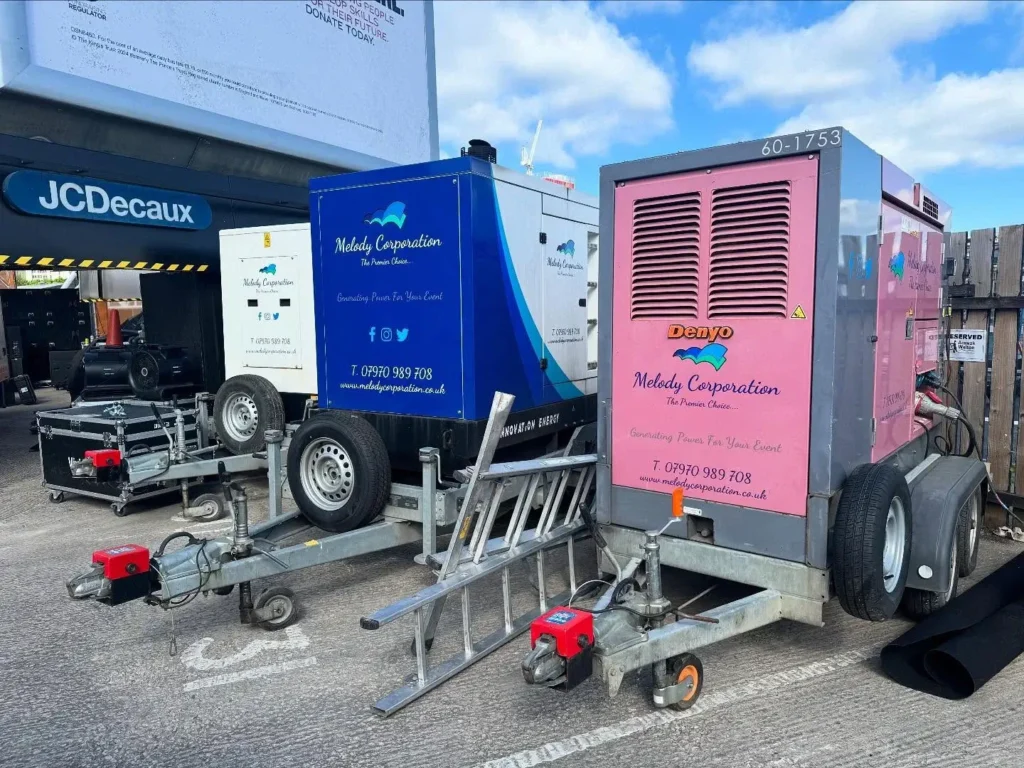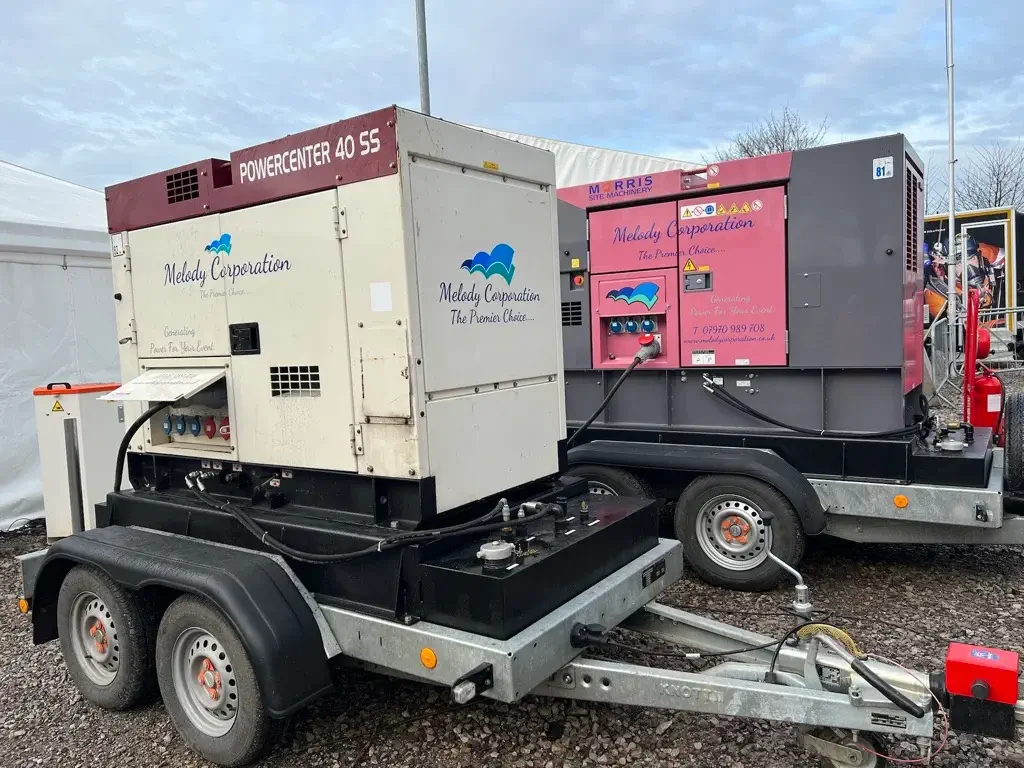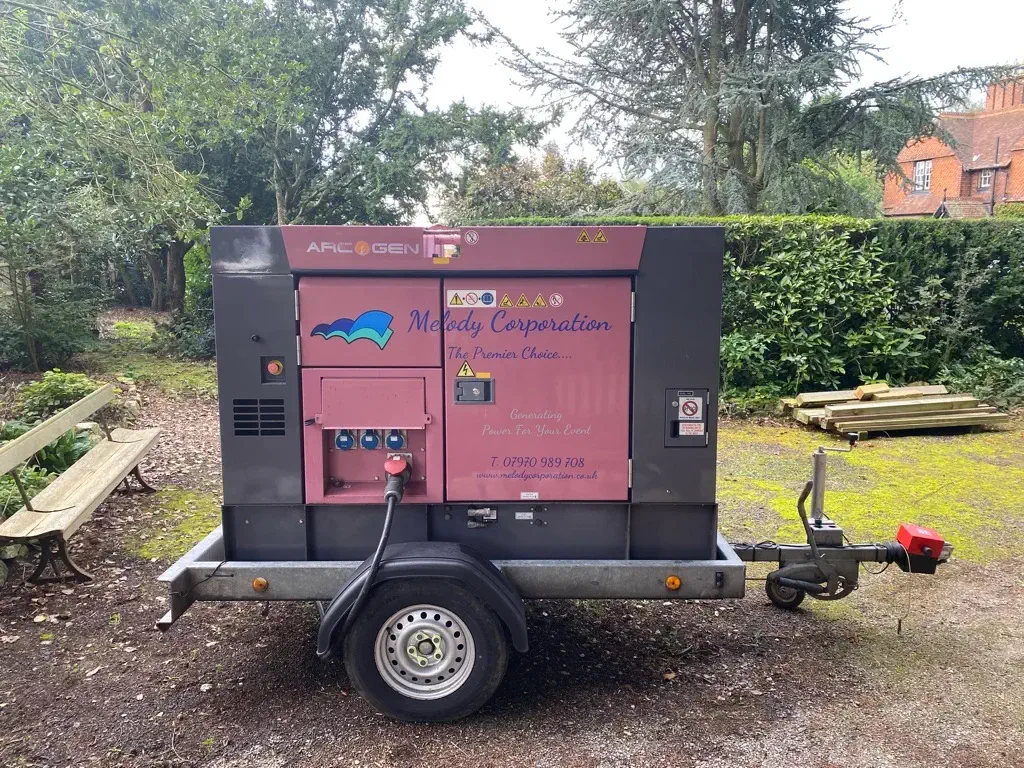If you’ve ever hosted an intimate outdoor gathering, a corporate event, or a music festival, you know how important it is to have a reliable generator on hand.
Generators are not just for outdoor events. They also serve a crucial role in emergencies and as a power supply for construction sites, healthcare facilities, and manufacturing plants.
They keep the lights on, the sound system running, and all equipment working smoothly, no matter where you are or how long your event lasts.
But if you’ve never hired one before, you might not even know where to begin.
That’s why, in this guide, we’ve outlined everything you need to know about generator hire so you’ll have the power to bring your event to life.
- Understanding the different types of generators
- Power requirements for generator hire
- Key features to consider when hiring a generator
- Cost considerations
- Finding a reputable supplier
- The generator hire process
- Maintenance and troubleshooting
- Need expert generator hire? Melody Corporation can help.
Understanding the different types of generators
Before you can choose the best generator for your event or facility, you should get to know the different kinds of generators available for hire.
Portable generators
Portable generators are exactly what they sound like. They’re small enough to pack for your next camping trip or keep on standby for DIY projects.
Standby and event generators
Standby generators can power your entire home in a power outage. They may turn on automatically when the grid fails, so you don’t have to sit in the dark and wait for the electricity to return.
Due to their greater power capabilities, standby generators are typically larger in size (and tend to cost more than smaller generators).
But if you live in an area with frequent power cuts from storms, they may be essential for you.
Inverter generators
Inverter generators are usually quieter, more compact, and more energy-efficient than other generators. They’re available in various sizes and are ideal for charging electronics like laptops and phones.
Now that you know some of the different generator types, it should be easier to choose one based on the power output you’ll need for your event.
Power requirements for generator hire
When hiring a generator, it’s important to select one that can handle your power requirements. A generator that’s too big can be costly. Hiring one too small can cause overheating, damage the generator, and provide an unreliable power supply. This is why it’s necessary to always calculate the wattage you need before hiring a generator.
Calculating wattage
- To calculate how much wattage you need, start by listing everything you’ll want to power with your generator.
- Check equipment labels to determine each device’s wattage. If the label shows amperage and voltage, use this formula to get the wattage:
Watts = Amps x Volts. For example, 10 Amps x 2300 Volts = 2300 Watts. - Some devices require additional power (known as ‘surge watts’) during the 2-3 seconds of startup. Check the device’s specifications for ‘surge watts’ or ‘starting watts’.
- Add up the running watts for all your devices, including the surge watts, if necessary.
Many wattage calculators, like the Omni calculator, can easily add up your power requirements.
Once you know how much power you need, you can hire the right generator. You can determine a generator’s power output by looking at its kVA rating. The higher this rating, the more power your generator can produce.
Key features to consider when hiring a generator
From size to noise to safe operations, there are a few things to keep in mind when hiring a generator.
Fuel efficiency
Diesel generators are usually more fuel efficient than those that run on other fuel sources, making them a more affordable option if used long-term.
Diesel generators are an excellent choice for emergency backup power for healthcare facilities, homes, and commercial buildings. They’re also regularly used on construction sites, for agricultural equipment, and for outdoor events like music festivals.
Pros and cons of diesel generators
Pros
- Diesel is an easy fuel source to obtain for your generator.
- A diesel generator is often the most suitable choice for facilities with high-wattage appliances or commercial purposes.
- Diesel generators are durable and relatively low-maintenance.
- Diesel is the least flammable compared to other fuel sources, so a diesel generator can be stored safely on-site.
Cons
- Diesel generators aren’t especially environmentally friendly; consuming 1L of diesel emits 2.7kg of CO2 on average. However, with the introduction of Stage 5 engines this is becoming less.
- Some standard diesel generators can be noisy. However, silent generators are more more widely available.
Noise levels
If your generator is used for residential purposes or in a public space, it’s important to consider the noise levels to not disturb others in the area. Generators with lower decibel ratings are quieter and less disruptive.
Generator noise levels are measured in dB(A), and most manufacturers give their generators a dB(A) rating from a set distance. Some smaller generators could be 85 decibels, similar to busy city traffic. Generators on the larger end could emit around 105 decibels, comparable to a nearby helicopter.
Silent generators are a convenient option for those who want the benefits of a diesel generator without excessive noise.
Generally, their noise level ranges from 75-85 decibels (like a noisy restaurant or a loud radio), but some can be as quiet as 50-60 decibels (like a standard conversation or an alarm clock).
Portability and size
Depending on the nature of your event or power needs, you may need to consider the size and portability of the generator you hire. Portable generators are, as their name suggests, easy to bring with you. Standby and event generators, on the other hand, will normally be transported by the hire company either as a road tow or on a lorry to be lifted off.
Safety features
It’s vital to familiarise yourself with some of the basic safety features of a generator to avoid any hazards or injuries.
- Circuit breakers: These help prevent generator overload, cutting off the power supply if it exceeds its capacity. This protects the generator and any connected appliances from damage.
- RCBO: These offer protection against earth leaks by stopping the power supply to avoid injury.
- Overheat protection: This function automatically shuts off the generator if it overheats, protecting it from damage and preventing fire.
- Fuel shutoff valve: This valve stops the fuel supply when the generator isn’t in use, avoiding fuel leaks and mitigating a potential fire hazard.
Cost considerations
Cost is understandably one of the most important factors to consider when hiring a generator. The cost of your generator largely depends on the size you choose, and how long you want to use it.
Different generator hire companies charge slightly different rates, ranging from daily to weekly to monthly.
Other factors that contribute to the overall cost of your generator hire include fuel costs and any delivery, pickup, insurance, and installation fees. Many companies also require a refundable deposit to cover any damage to the generator during the rental period.
Costs like these can vary depending on your location, your generator requirements, and the company you’re dealing with. Always make sure you’re clear on all fees before hiring your generator to avoid unexpected costs.
Finding a reputable supplier
As with any product or service, you want to ensure that you’re getting value for your money, and that you’re dealing with a supplier who meets your needs.
- Do your research
Look at online reviews and testimonials for companies in your area, and ask around for a recommendation.
- Check certifications
Confirm that your suppliers are legitimate and have the appropriate credentials — especially BS 7909 certification.
- Customer service
Dealing with a company with responsive and helpful customer service makes all the difference. Find a team that will communicate with you every step of the way and address any issues that may arise.
The generator hire process
If you don’t know where to begin with hiring a generator, don’t worry! We’ve got the entire process laid out for you below so you can feel confident in knowing what to look for.
Initial questions to ask
When looking to rent a generator, it’s crucial to prepare all your questions beforehand. To help, we’ve compiled a few questions you can ask to make sure your generator hire company is the right choice.
- What size generator do you recommend for my event?
- What’s the generator’s output in kW?
- What fuel type does the generator use?
- Does the generator come with fuel? If not, do you offer fuel delivery services?
- How much does it cost to hire for the period I’m looking for?
- What happens if the generator breaks down or malfunctions?
- What’s the generator’s noise level?
Evaluating generator condition
There are some things to watch out for to ensure the generator you hire is in good working condition.
Watch out for any signs of exterior damage, rust, fluid leaks, and unusual noises when the generator runs.
Understanding your rental agreement
While some rental conditions may vary from provider to provider, the basic elements of most generator rental agreements include:
- Both the rental company and the renter’s contact information.
- A description of the generator, its condition, and any extra equipment included.
- The rental start and end dates.
- All rental fees and costs (i.e., hire rates, delivery and installation costs, fuel costs, and deposit).
- Payment terms (i.e., if the costs are being paid upfront or in instalments).
- Insurance and liability details.
- Permitted and prohibited uses of the generator.
- Any safety instructions that the renter must know.
- Cancellation policy.
- Any warranties or guarantees.
- The signatures of both the rental company and the renter.
What to expect with delivery and setup
The generator hire company should provide all information about the delivery date, time, and location beforehand. Keep in mind, they may need to conduct a site assessment of the location before delivery.
Depending on the size of your generator, it will usually be delivered by truck. The team delivering it will inspect the generator to ensure it’s in good working condition.
The generator must be placed in a well-ventilated, spacious, and level area, taking into account refuelling, maintenance work, and access to power cables.
The generator rental company will take care of grounding the generator, and depending on the rental agreement, they may arrange an initial fuel supply.
Once the generator is set up, the company technicians will carry out any initial tests, safety checks, and electrical system connections.
If any issues should arise during the rental period, most generator hire companies provide 24/7 technical support to keep things running smoothly and safely.
Basics of operating a generator safely
Modern generators are safe and efficient to use, but they’re not without their risks. The primary hazards associated with a generator are carbon monoxide (CO) poisoning, electrical shocks, and fire.
Preventing CO poisoning: The generator should be kept in a well-ventilated area, outside, or at least 6 metres away from any buildings, windows, or vents.
Electrical safety: Never plug the generator directly into an outlet in your home. This can cause ‘back feeding’, which sends electricity back into the grid, putting utility workers in danger and potentially causing electrical shock.
Fire safety: Always store fuel safely and refuel the generator carefully, as overfilling or spilling fuel could cause a fire. Keep a fire extinguisher nearby, and never leave any flammable materials around the generator.
Maintenance and troubleshooting of long-term hires
Beyond the safety risks, sometimes mechanical issues can interfere with your generator’s function. Luckily, there are a few things you can do to keep your generator in top condition during your rental period.
- Visual inspections: Check the generator regularly for signs of wear and tear or damage. If left unchecked, loose connections, frayed wiring, or rust can cause bigger problems later.
- Cleaning: Take the time to clean the generator to prevent debris or dirt from building up. It’s harder to inspect a dirty generator and identify any damage.
- Oil changes and air filters: Ask your generator rental company how often you should change the oil and what kind of oil your model needs. Check oil levels frequently, as low oil could cause severe engine damage. Replace air filters regularly, as dirty filters can reduce the generator’s efficiency.
- Test regularly: If your generator has been unused for a long time, start it periodically to ensure everything is in working order.
Troubleshooting tips
Having an issue with your generator hire? We’ve outlined some common problems that can crop up in generators and how to fix them.
The generator won’t start
- Check that there’s enough fuel in the tank.
- Make sure there’s adequate oil and water in the engine.
- Check the emergency stop button isn’t pressed.
- Check the battery isolator is on.
The generator starts but stalls
- Make sure the carburetor isn’t dirty, as this can prevent the fuel from flowing properly.
- Check for blockages or leaks in the fuel line.
- There may be too many appliances connected to the generator which can cause overloading.
There’s excessive smoke coming from the exhaust
- A dirty air filter is usually the culprit. Clean or replace the air filter if needed.
- Overfilled oil can cause white or blue smoke from the exhaust. Drain any excess oil and check that it’s at the correct level.
- The generator may be “coked” – have heavy carbon build-up – and need load banking.
The generator is overheating
- Air vents could be blocked, preventing proper cooling. Clean the air vents often to keep dust and debris from accumulating.
- Low oil levels can cause the generator to overheat. Top up the oil to the correct level and see if the temperature reduces.
- Check that the water level isn’t low.
If you’ve tried these solutions and still have a problem with your generator, contact the installation team. If you’re unsure what the issue is or how to fix it, it’s best to let the professionals handle it to avoid any unnecessary damage or injury.
Need expert generator hire? Melody Corporation can help.
Whether you’re organising a wedding, festival, corporate event, or you need a commercial generator, it’s important to understand the types of generators available and all the safety information required.
We hope that by following this guide, you can feel confident choosing a provider and hiring a generator for your next event.
Still looking for a reliable service? We provide diesel generators in a range of sizes, supplying power for all kinds of outdoor events. With short-term and long-term generator hire available at competitive rates, we’ve got you covered.
We keep our process simple so you can focus on planning the perfect event.
- We’ll consult with you to get to know the details of your event and recommend an appropriate generator.
- We supply cables and handle all equipment installation so you don’t have to.
- We test everything to ensure full safety and efficiency.


